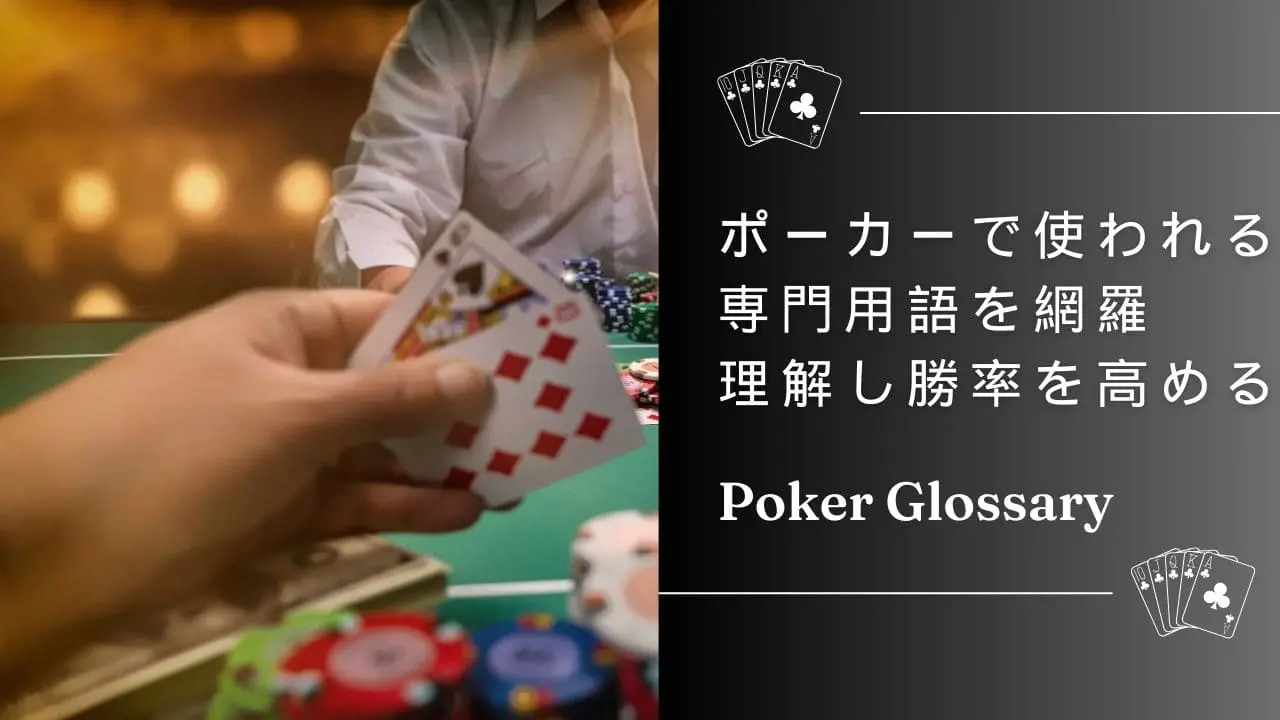Understanding fundamental terms and strategies is crucial when playing poker. This article categorizes and explains essential poker terminology, making it useful for beginners and experienced players alike. Whether you are just starting or looking to deepen your knowledge, this guide provides valuable insights.
Basic Poker Terms
Pot
The total amount of money or chips wagered in a game. The pot grows as players bet, and the winner of the hand takes the entire pot.
Blinds
Mandatory bets placed before the cards are dealt. There are two types: “Big Blind (BB)” and “Small Blind (SB).” Blinds ensure the game progresses and prompt player actions.
Dealer
The player responsible for dealing cards. The dealer position rotates in each hand, allowing all players to take turns being the dealer.
Hole Cards
The two private cards dealt to each player at the beginning of a hand. These cards are combined with community cards to form the final hand.
Community Cards
Shared cards placed in the center of the table. These are dealt in three phases: the Flop, Turn, and River, and are used by all players to create their hands.
Check
Passing the action to the next player without betting. A player can check if no bets have been placed during the round.
Bet
The act of placing chips into the pot. Betting initiates the action in a round and can increase the pot size.
Raise
Increasing the bet amount after another player has already bet. A raise puts pressure on opponents and can force them to fold.
Call
Matching another player’s bet to stay in the hand. Calling is often done when a player has confidence in their hand.
Fold
Discarding one’s hand and forfeiting any bets already placed. Folding minimizes risk when holding a weak hand.
Hand Rankings and Strength
Royal Flush
The strongest possible hand in poker, consisting of A, K, Q, J, and 10 of the same suit. It is extremely rare and unbeatable.

Straight Flush
Five consecutive cards of the same suit. A straight flush is very powerful, second only to a royal flush.

Four of a Kind
Four cards of the same rank. This is one of the strongest hands in poker, ranking above a full house.

Full House
A combination of three matching cards and a separate pair. It is a strong hand, ranking below four of a kind and above a flush.

Flush
Five cards of the same suit, not in sequential order. The strength of a flush is determined by the highest-ranking card.

Straight
Five consecutive cards of any suit. If all five cards share the same suit, it becomes a straight flush.

Three of a Kind
Three cards of the same rank. Though not as strong as a full house or straight, it can still be a winning hand in many situations.

Two Pair
Two separate pairs of matching cards. Stronger than one pair but weaker than three of a kind.

One Pair
A single pair of matching cards. One of the most common hand rankings.

High Card
If no other hand rankings apply, the highest single card determines the winner. The highest-ranking card, typically an Ace, is the deciding factor.

Game Progression Terms
Flop
The first three community cards dealt face-up on the table. Players then decide their next move.
Turn
The fourth community card dealt. Players make further decisions based on their hand strength.
River
The fifth and final community card. The last betting round follows this reveal.
Showdown
The moment when players reveal their hands after the final round of betting. The best hand wins the pot.
Strategic Terms
Value Bet
A bet made with a strong hand to extract maximum value from an opponent.
Bluff
Betting or raising with a weak hand to deceive opponents into folding.
Semi-Bluff
Bluffing with a hand that has potential to improve, such as a straight or flush draw.
All-In
Betting all remaining chips. This move is high-risk but can result in significant rewards.
Pot Control
Keeping the pot size manageable to minimize risk, even with a strong hand.
Draw
A hand that needs one more card to complete a strong combination, such as a straight or flush draw.
Raise or Fold
A strategy where a player either raises with a strong hand or folds with a weak one, avoiding unnecessary calls.
Position
A player’s turn order in a hand. Later positions have more strategic advantages as they act after other players.
Poker Format-Specific Terms
No Limit
A format where players can bet any amount at any time, including going all-in.
Pot Limit
A format where bets cannot exceed the current size of the pot.
Texas Hold’em
The most popular poker format where each player is dealt two hole cards and must make the best hand using five community cards.
Omaha
A format where players receive four hole cards but must use exactly two in combination with three community cards.
Stud
A format where players are dealt a mix of face-up and face-down cards with no community cards.
Poker Chip Terms
Chip
A token representing money in a poker game.
Chip Leader
The player with the most chips in a game.
Short Stack
A player with a low number of chips, requiring cautious play.
Positional Terms
Early Position (EP)
Seats that act first in a hand, requiring stronger hands for betting.
Middle Position (MP)
Seats between early and late positions, allowing for more flexibility.
Late Position (LP)
Seats that act last in a hand, providing a strategic advantage.
Cutoff (CO)
The position right before the dealer, often used for aggressive plays.
Button
The dealer position, considered the most advantageous as it acts last.
Online Poker Terms
Table Selection
Choosing a poker table with weaker opponents to maximize profits.
Snap Call
Instantly calling a bet, often indicating confidence in one’s hand.
Multi-Tabling
Playing multiple poker games simultaneously online to increase action.
By understanding these terms, you can improve your poker skills and make better strategic decisions at the table. Whether you’re a beginner or an advanced player, mastering poker terminology is key to success.


